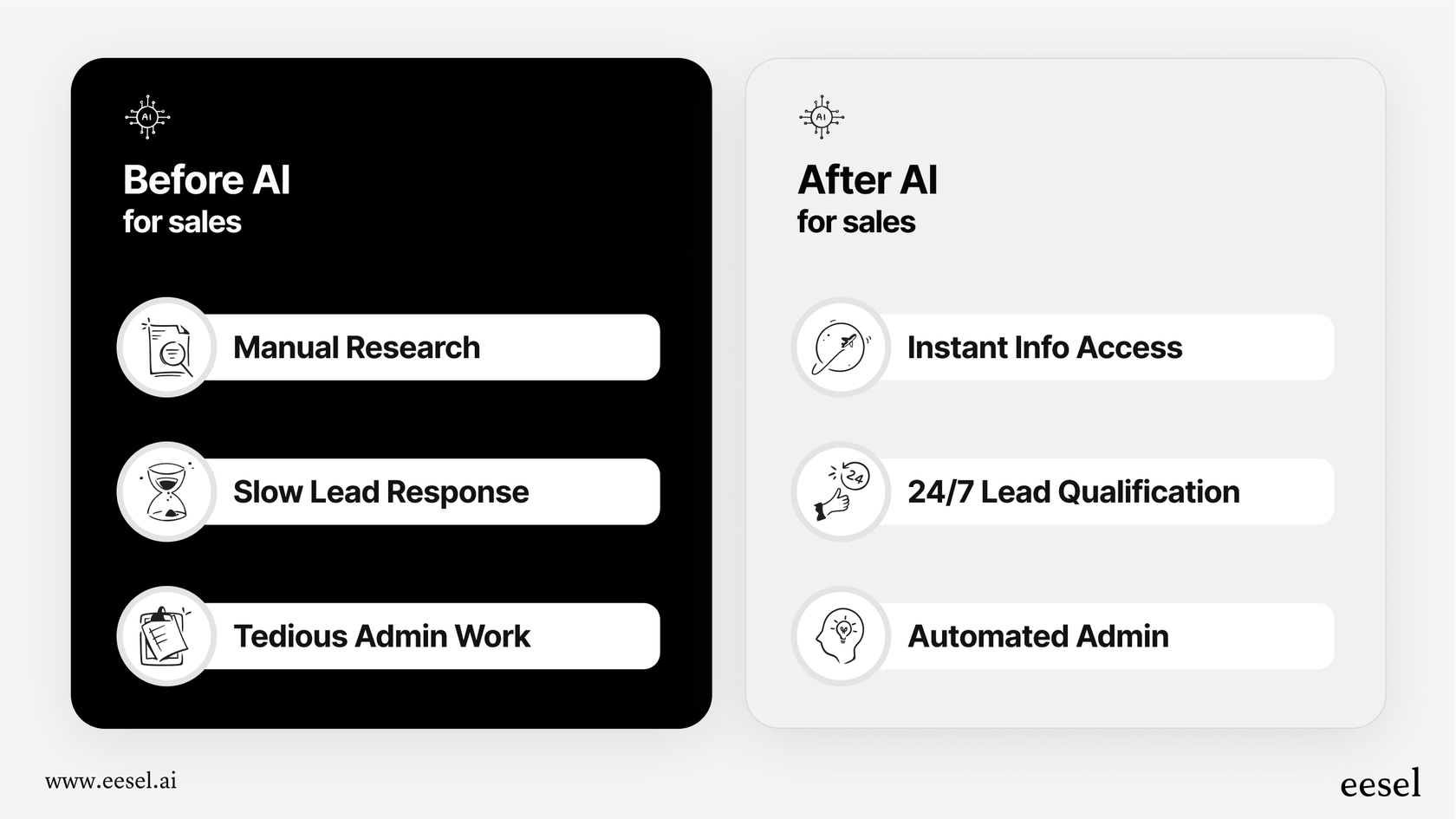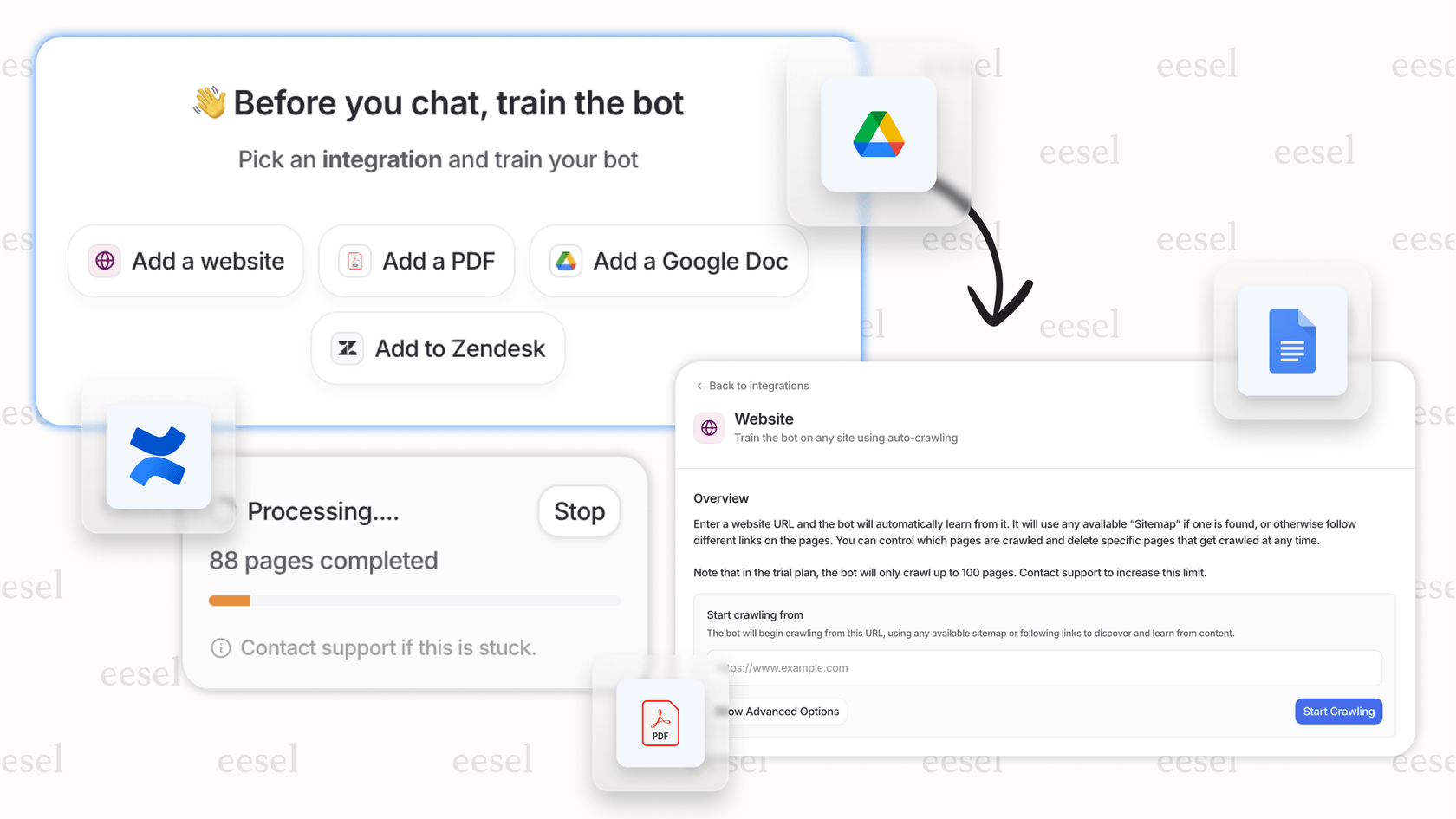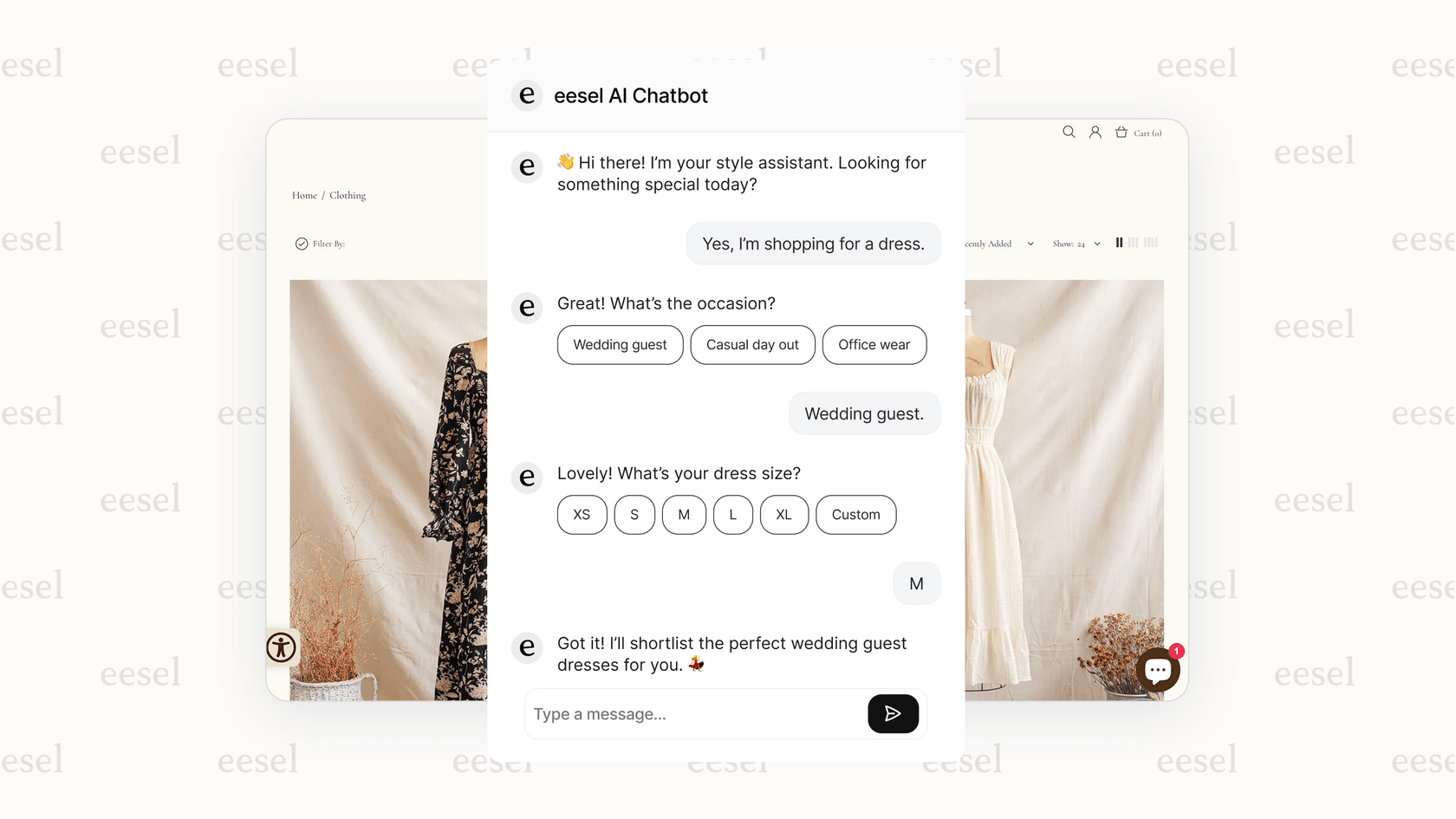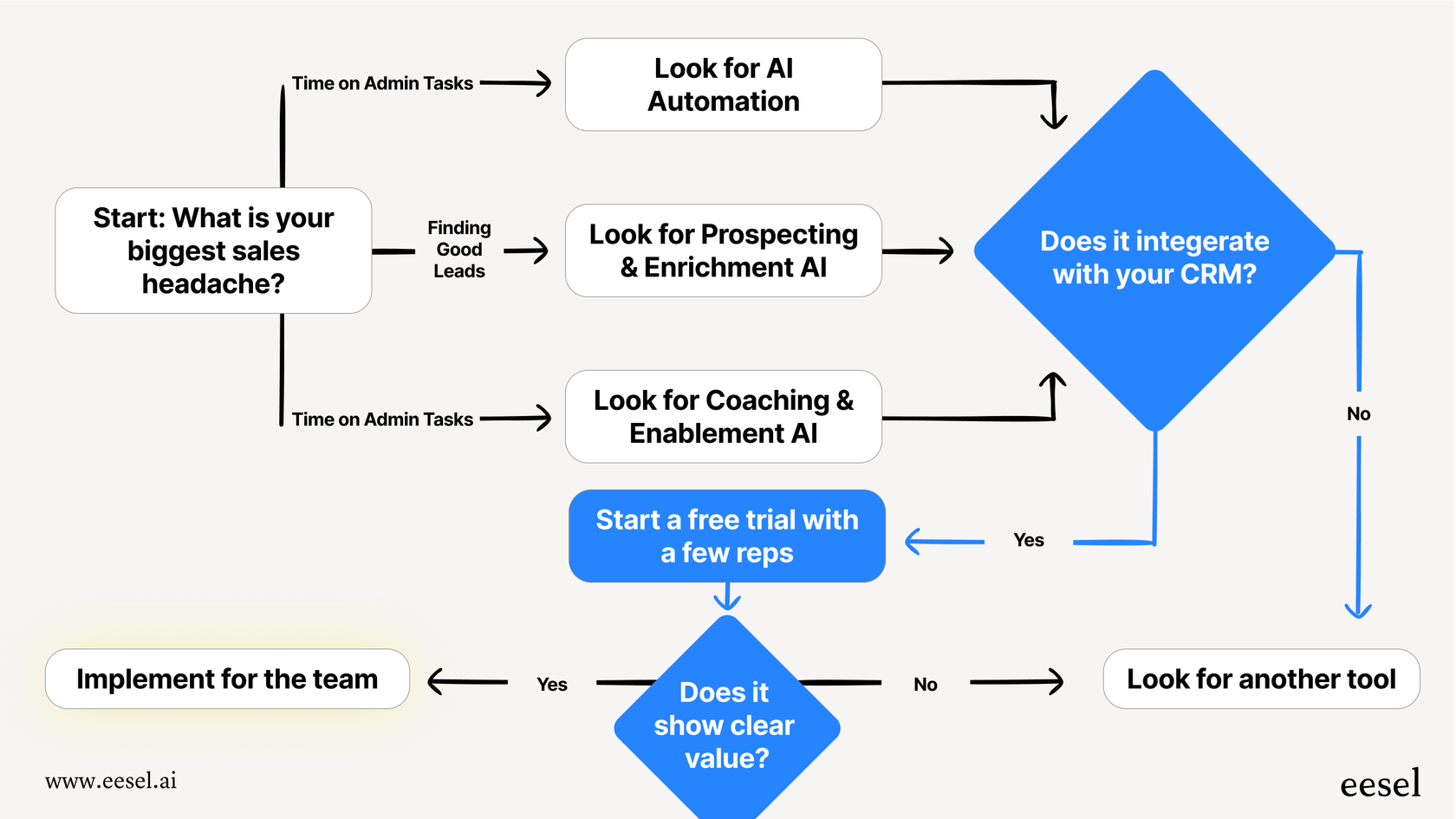
It turns out that top-performing sales teams are almost five times more likely to use artificial intelligence than their peers who are struggling. When you look at a salesperson's average day, that makes a lot of sense. Most reps are swamped with admin work, find it tough to personalize outreach to lots of people, and have that sinking feeling of not finding the right info when a prospect is on the line. It's a juggling act that leaves very little time for actually selling.
AI sales tools can help by acting as a copilot for your team. They automate the boring stuff and surface the information reps need to build relationships and close deals. This article will walk you through the 10 best AI tools to give your sales team an edge in 2025. We'll break down what they do, explain how we chose them, and help you find the right one for your team.
What is AI for sales?
AI for sales is simply using artificial intelligence to make the sales process smoother and more effective. The idea isn’t to replace your sales team, but to give them a serious boost. By taking over the repetitive, manual work, AI lets your reps focus on what they do best: talking to people.
These tools generally help in a few key areas:
- Getting reps the right info: These tools give your team instant access to the answers they need to win a deal. Imagine an internal assistant that can pull up product specs, competitor battle cards, or pricing details in a snap. They can also analyze sales calls to offer coaching tips and help reps get better.
- Finding and talking to leads: AI can hunt for lead data online, run chatbots on your website to qualify visitors 24/7, and even help write personalized outreach emails that don't sound robotic.
- Automating sales tasks: This is where AI really helps with the administrative load. These tools can automatically update your CRM, summarize calls, transcribe meetings, and help you create more accurate sales forecasts.
At the end of the day, using AI for sales means your team can work more efficiently, make smarter decisions, and give customers a better, more personalized experience.

How we picked the best AI for sales tools
To give you a list you can actually use, we didn't just pick the flashiest names. We looked for tools that provide real value, based on a few straightforward criteria:
- It had to be real AI: We focused on tools that use genuine artificial intelligence, machine learning, and natural language processing. These aren't just simple automation scripts; they learn and adapt.
- It had to solve a real problem: Every tool on this list helps with an everyday sales headache. Whether it’s finding good leads or getting answers during a live call, these tools are built for the daily grind.
- It had to play well with others: The best tools connect easily with the software you already use. We chose platforms that integrate with your CRM, email, and tools like Slack or Microsoft Teams without a massive overhaul.
- It had to be easy to use: You shouldn't need a data science degree to use an AI tool. We picked platforms with simple interfaces that sales reps can figure out quickly.
- It had to be worth the money: Each tool has to show a clear return, whether that’s through time saved, more leads, or higher win rates.

The best AI for sales tools at a glance
Here’s a quick look at our top picks to help you see how they compare.
| Tool | Best For | Standout Feature | Starting Price |
|---|---|---|---|
| eesel AI | Unified sales enablement & lead engagement | Layers on top of existing tools without migration | $239/month (annual) |
| Regie.ai | All-in-one AI sales outreach | Generates entire outreach campaigns | By request |
| Dialpad Sell | Real-time AI call coaching | Live assist cards pop up during calls | $49/month |
| Clay | Scraping and enriching lead data | "Waterfall" data enrichment from multiple sources | $149/month |
| Lavender | AI-powered email coaching | In-inbox email scoring and suggestions | $29/month |
| Salesforce Einstein GPT | AI integrated directly into your CRM | Uses your live CRM data to generate content | Included in Enterprise plans |
| Avoma | AI-powered sales meeting intelligence | AI scorecards to evaluate meeting performance | $69/month (for AI features) |
| Postaga | Generating entire outreach campaigns | Analyzes your domain to suggest campaign ideas | $99/month |
| Microsoft Copilot for Sales | Teams in the Microsoft ecosystem | Seamless integration with Teams and Outlook | Bundled with Dynamics 365 |
| Nooks | Automating SDR prospecting | Autonomous AI agent for cold calling and booking | Not public |
A deep dive into the 10 best tools for AI for sales in 2025
Here's our detailed breakdown of the AI tools that can help your sales process.
1. eesel AI
Best for: Bringing all your sales knowledge and lead engagement into one place without changing your existing tools.
Why it's on the list: eesel AI is a smart platform that works on top of the tech you already have. For sales teams, it solves two big problems: finding information fast and engaging with leads. You can create an internal sales assistant that learns from your Confluence pages, Google Docs, and Slack conversations. This allows reps to ask questions and get immediate, accurate answers about anything from product features to competitor info. At the same time, you can use its AI Chatbot on your website to qualify leads around the clock, powered by the exact same knowledge.

Pros:
- It works with your current setup (like Zendesk or Notion), so there’s no messy migration.
- It trains on your specific company knowledge, so the answers it gives are always relevant.
- You can create separate, specialized assistants for different teams like Sales or Support.
Cons:
- Doesn't have its own built-in features for analyzing voice calls. Pricing: The Team plan starts at $239/month when billed annually.
2. Regie.ai
Best for: An all-in-one platform for AI-powered sales outreach.
Why it's on the list: Regie.ai is a full suite of AI tools made to handle the entire outreach process. It helps with finding prospects, writing personalized messages, setting up email sequences, and even creating social media content. It's like having a dedicated, AI-powered command center just for outreach.
Pros:
- Offers a wide range of AI tools specifically for sales outreach.
- Can manage and automate an entire outreach campaign from start to finish.
Cons:
- It can feel a bit walled-off, as it doesn't integrate with as many other tools.
- You have to ask for the price, which makes it hard to know if it fits your budget. Pricing: By request.
3. Dialpad Sell
Best for: Real-time coaching and analysis during sales calls.
Why it's on the list: Dialpad Sell is a communication platform with a plan built for sales teams. Its AI is most impressive during live calls. "Real-Time Assist" cards pop up on a rep's screen with talking points whenever keywords (like a competitor's name) are mentioned. It also analyzes sentiment on the fly and can score calls based on your own checklist.
Pros:
- Gives live coaching and help right in the middle of a sales call.
- Automatically figures out which call scripts work best.
- Connects with CRMs like Salesforce.
Cons:
- It's a complete communication system, which might be overkill if you like your current phone setup and just want to add some AI features. Pricing: Starts at $49/month per user.
4. Clay
Best for: Finding and enriching lead data automatically.
Why it's on the list: Prospecting can be a real grind. Clay uses AI to automate this by building detailed lead lists from places like LinkedIn. It finds contact info and adds dozens of useful details to each profile, from recent company news to what competitors they use.
Pros:
- Its data enrichment features build really detailed profiles of potential customers.
- Has a built-in AI bot (Claygent) that helps you clean up and work with your data.
Cons:
- Mostly relies on LinkedIn, so it might not be as useful for industries that aren't big on that platform.
- The accuracy of the emails it finds can be a bit hit-or-miss.
Pricing: Free plan available; paid plans start at $149/month.
5. Lavender
Best for: AI-powered coaching for writing better emails.
Why it's on the list: Lavender is an AI email assistant that works as a browser extension right inside your inbox. It scores your sales emails as you write them, giving you feedback on tone, clarity, and complexity. It helps reps write emails that are more likely to actually get a reply.
Pros:
- Fits right into your existing workflow in Gmail or Outlook.
- Gives clear, helpful tips to improve writing skills.
- The team dashboard lets you see how things like open and reply rates are improving.
Cons:
- Some people might find the in-inbox help a bit cluttered if they prefer a cleaner look.
Pricing: Basic free plan available; paid plans start at $29/month per user.
6. Salesforce Einstein GPT
Best for: Teams who live and breathe Salesforce.
Why it's on the list: If your team uses Salesforce, Einstein GPT brings AI directly into your main workspace. It uses your own CRM data to write personalized emails, summarize account histories, and create call notes, so you know the AI is working with info you trust.
Pros:
- Connects deeply with your Salesforce data for relevant and secure AI suggestions.
- Automates annoying tasks like data entry and creating follow-ups inside the CRM.
Cons:
- It locks you into the Salesforce world, so there's not much flexibility if you use other tools.
- It’s only available on the more expensive Salesforce plans, which puts it out of reach for many smaller teams.
Pricing: Included with Salesforce Enterprise ($165/user/month) and Unlimited plans.
7. Avoma
Best for: AI-driven intelligence for your sales meetings.
Why it's on the list: Avoma is a meeting assistant that records, transcribes, and analyzes sales calls. Its AI is particularly good for coaching. It uses machine learning to score how well a rep did in a meeting based on your rules (for example, did they remember to ask about the prospect's budget?).
Pros:
- The AI scorecards give you objective feedback on how a meeting went.
- Automatically figures out what topics were discussed and creates summaries, saving a lot of time on note-taking.
Cons:
- The best AI features, like the scorecards, are only in the higher-priced plans.
Pricing: The Conversation Intelligence plan is $69/month per user.
8. Postaga
Best for: Building entire outreach campaigns from scratch.
Why it's on the list: Postaga is an AI tool focused on automating the whole process of creating outreach campaigns. It walks you through everything, from looking at your website for content ideas to finding the right contacts and writing a multi-step email sequence.
Pros:
- Great for specific types of outreach like link-building, PR, or promoting content.
- The AI assistant guides you through the campaign creation process.
Cons:
- The interface isn't as slick or easy to use as some other tools.
- It's not as good at finding leads as specialized tools like Clay.
Pricing: Starts at $99/month.
9. Microsoft Copilot for Sales
Best for: Teams that are all-in on the Microsoft ecosystem.
Why it's on the list: Microsoft Copilot for Sales puts AI right inside the tools that many teams use every day: Outlook and Teams. It acts as a sales assistant that can summarize long email threads, get you ready for meetings, and pull in relevant data from your CRM (especially Dynamics 365).
Pros:
- Fits perfectly with Microsoft 365, so you're not constantly switching between apps.
- Brings CRM data and AI help directly into Outlook and Teams. Cons:
- It works best if you use Dynamics 365 as your CRM; it can be less useful with other CRMs. Pricing: Usually bundled with Dynamics 365 Sales plans or available as an add-on.
10. Nooks
Best for: Automating the prospecting work of an SDR.
- Why it's on the list: Nooks is on the cutting edge of AI in sales. It’s built to act like an autonomous Sales Development Representative (SDR). That means it can automate cold calls, book meetings, and handle follow-ups all on its own with very little human input.
Pros:
- Can dramatically increase your outbound prospecting volume.
- Automates one of the most repetitive and toughest parts of sales.
Cons:
- Since it's a newer technology, it requires a lot of trust and careful setup to make sure it represents your brand well.
Pricing: Not publicly listed.
How long does it take to set up an AI for sales tool?
It really depends. A simple browser extension could be ready in minutes. A bigger platform could take weeks. But modern tools like eesel AI are designed to get you started quickly, with simple integrations that let you connect your knowledge and see results in hours, not months.

How do you measure the ROI of an AI for sales tool?
Look at both the numbers and the feedback from your team. You can track things like time saved on admin work, an increase in qualified leads, a shorter sales cycle, and better win rates. You should also ask your reps if they're happy with the tool and if it's helping them do their job better.
| Metric Category | Key Performance Indicators (KPIs) |
|---|---|
| Efficiency Gains | Time saved on admin tasks, Number of calls/emails per rep |
| Pipeline Growth | Increase in qualified leads, Shorter sales cycle length |
| Revenue Impact | Higher conversion/win rates, Increased average deal size |
| Team Enablement | Rep satisfaction scores, Faster new hire ramp-up time |
How to choose the right AI for sales for your team
Feeling a bit lost with all the options? Here’s a simple way to think about it.
- Find your biggest headache first. Before looking at any tool, figure out what's slowing your team down the most. Is it prospecting? Inconsistent performance? Too much time on admin? Pick a tool that solves your most painful problem.
- Think about your current tools. The best AI tool is one your team will actually use. Look for options that connect with the CRM, email, and chat apps you already have. This is where a platform like eesel AI is great, because it's designed to be a flexible layer on top of your current setup, not a replacement.
- Make it easy for your reps. Tools that fit into a salesperson's daily routine, like a browser extension or a Slack bot, usually get used the most. If a tool forces them to open yet another app, they'll probably forget about it.
- Try before you buy. Run a small test with a few motivated reps before you commit to a company-wide plan. Use free trials to see if the tool actually delivers value without any risk.
- Decide between a specialist and a generalist. Do you need one tool that does a single job really well (like Lavender for email coaching)? Or is the built-in AI in your CRM (like Salesforce Einstein) good enough for what you need?
Give your sales team a boost with AI for sales
Using AI in sales isn't a sci-fi concept anymore; it's a real strategy for building a more efficient and successful sales team. The tools on this list are a great place to start if you want to automate repetitive work and give your reps the information they need to close more deals.
The most important thing is to find a solution that works with your team, not against them. eesel AI brings your scattered sales knowledge together and helps automate customer engagement by working with the tools you already use. You can give your sales team an internal assistant for instant answers and a website chatbot to qualify leads 24/7.
Ready to see how it works? Start a free trial or book a demo with our team today.
Frequently asked questions
Absolutely. Many modern AI tools are priced for small businesses and offer free trials, allowing you to see the value first. These tools can help a small team punch above their weight by automating tasks and providing insights that were once only available to large corporations.
The best tools are designed to be intuitive and fit right into your team's existing workflow, often requiring minimal training. Adoption is highest when the tool solves a clear pain point, like reducing admin time, so focus on choosing a solution that provides immediate value.
Trust is built by starting with your own data. The most reliable AI tools are those that train on your company's internal knowledge base and CRM, as they provide highly accurate and relevant outputs, though it's always wise to have a human review critical AI-generated content.
Consider using it for real-time call coaching, where AI provides talking points during a live conversation with a prospect. You can also use it to instantly find answers to complex product questions or to identify the best-fit leads from a large list based on your ideal customer profile.
Yes, it's crucial to be transparent and use AI to enhance the customer experience, not to be deceptive. Always ensure your use of data respects privacy laws and that AI-powered personalization feels helpful and relevant, rather than intrusive.
Share this post

Article by
Kenneth Pangan
Writer and marketer for over ten years, Kenneth Pangan splits his time between history, politics, and art with plenty of interruptions from his dogs demanding attention.






